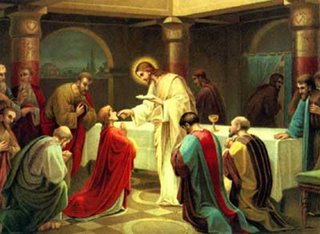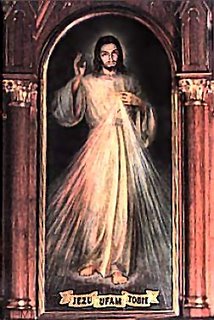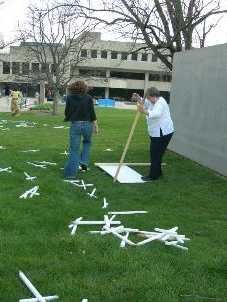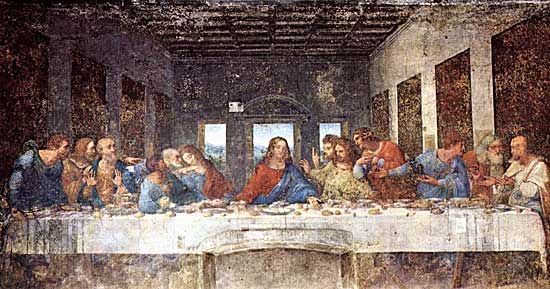 This morning and willy-nilly, I have had that truth brought home to me in several ways.
This morning and willy-nilly, I have had that truth brought home to me in several ways.One was by a homily of the young-and-upcoming Fr. Philip Powell, OP, posted in full at his blog, which he uses primarily to do just that. It is entitled "The Devil's Poisoned Bumperstickers." Now, whenever I'm alerted to a cleric who's going to admit that the Devil actually does something interesting, I listen; such perspicacious priests cannot be taken for granted in the Church today. In this case I was not disappointed. Fr. Powell begins by quoting Christ's words in the gospel reading for today:
"Why are you troubled? Why do questions arise in your hearts?" What do you fear? What worry eats at your spirit, chewing your joy? Who took your peace?Read it all through the link provided. The two bumper-stickers Fr. Powell discusses are God loves us unconditionally; God accepts us just as we are and (here's the really subtle one) I have an adult faith; I’m into spirituality not religion. The Devil uses such half-truths as a way of blocking our assent to the real truth. The real truth blocked by the former is that God loves us in order to change us, so that repentance is a precondition of receiving his love to good effect. The real truth blocked by the latter is that spirituality is meant to be incarnate in religion, so that each is misleading when divorced from the other.
I am convinced that for a whole lot of us it is the Devil who teaches us our theology, the Devil who instructs us in the faith. He uses half-truths, whispered hints at beauty, mumbled tries at goodness. He hands you a penny and calls you rich; he burps in your face and calls it a gentle summer breeze. And you buy it. We all do at one time or another. He tells us what we think we need to hear. What we wish were true. He lies and we believe it and we take notes and we repeat to him what he taught us because he fears the truth all the time as much as we do only some of the time.
Once I pondered that, I knew that by the grace of God, I have not been personally taken in by either of those bumper-stickers. But I was also shown at once what my bumper sticker is. I realize that, in order to rise to eternal life in Christ, we must die with him in our daily lives. Wracked by sin and destined for death, the old self must be broken and remade so that we can become what we are re-created to be. That entails repentance and suffering as features of ongoing conversion and sanctification. All true, and all too true. But I find it too easy, almost natural, to become so immersed in that reality that I lose sight of the small consolations and foretastes of glory that ordinary life also offers. As a result, I am subject to discouragement and cynicism, which in turn lead to depression and sloth. The suffering and struggle seems so much more real, more persistent, than the beauties and consolations that I am tempted to experience this life as a bad joke that God enjoys playing on me. That temptation comes straight from hell. But resisting it is ongoing spiritual combat, and I must admit that I don't win every skirmish.
Day after day, my nose is rubbed in the raw facticity of this fallen world, of which I am very much a part. For example, I love the theology of the body—as a set of ideas that I understand a lot better than your average Catholic. Accordingly, I venerate marriage and family as the Church understands them—as ideals I have failed even to approach. In reality, I'm twice-divorced-and-annulled, and can't even afford to have a regular, face-to-face relationship with my children. Why the latter? See the previous post. It's rather depressing, and gets steadily more so if I neglect my spiritual exercises. Dating, which is the worldly answer, is also a non-starter. Because I pay my child support I cannot afford to pay for dates, which puts me at a huge disadvantage with single women—save for rich widows, of whom I know none. And even if I did have the cash, all the women I like are married! Of course they are: what else would they be? I have got the message that the Lord wants me to focus on his love and the mission he has for me. But then there's that job-and-career issue again. I must walk, nay run, by faith and trust—not by sight.
Many people have their own, relevantly similar stories to tell. But where and how are we going to experience the joy and consolation that help keep us moving toward the light at the end of our tunnels? The beauties and pleasures of this world are ephemeral; sooner or later, they will dissipate and let us down. We must seek to fulfill the purpose of life: union with God. The rock-bottom prerequisite for that is real humility, which in turn entails being broken. And given human weakness, we need spiritual discipline to stay broken, contrite, and humble. The life of spiritual discipline designed for the purpose—prayer, liturgy, sacrifice, devotions—is called ascesis, and the monastic tradition, especially of Eastern Christianity, exists to enable some people to devote their lives to it, both for their own salvation and as a sign to the rest of us of what we must make out of our own lives in the world. When we have an ascetical regime and stay faithful to it, we are given the consolations we need.
Most of us laity, however, don't have the luxury of performing explicitly religious acts most of the time. Aside from the sacraments of reconciliation and Eucharist, our most important ascesis is daily life—its challenges, struggles, and sufferings. But the Church these days seems to be doing little to facilitate what I shall call an ascetical awareness that would equip laity to cultivate their daily lives as spiritual sacrifices. As usual, Phil Blosser puts the point well:
Again: all too true. Phil's discussion is about all the negative reaction to Opus Dei, but his explanation is on target and must be generalized. The trouble with American Catholicism today is that it's too darn comfortable. It positively encourages people to forget that "life is war," a spiritual combat in which we are urged and equipped to overcome the world, the flesh, and the Devil. Once we forget that, we forget that we belong to the Church Militant, which make us incapable of appreciating what it means to belong to the Church Triumphant. We cannot bear what C.S. Lewis called "the weight of glory." Thus we deprive ourselves of the only consolations that won't let us down. Is it any wonder why more Catholics have recourse to booze and anti-depressants than to confession?It used to be that Catholics had to fast from midnight Saturday until they received Communion at Mass Sunday morning. That fast has now been reduced to one hour before Communion. There is little guilt in Catholicism and virtually no fear of punishment, and everyone is virtually assured of going to heaven. What's to fear? Who goes to confession anymore? Whatever became of sin? If none of these things matter, furthermore, why trouble oneself to go to Mass at all? The music and homilies are pretty bad anyway.
Thus the few things that remain, as residual reminders of a former Catholic world strike us as rather quaint or strange, if not troubling. Fasting? Abstinence? But why? As if it's not bad enough that the Church should intrude into our bedrooms, why should the Church intrude into our dietary lives? What business is it of the Church's what I eat or how much? Days of both fasting and abstinence have been reduced to two -- Ash Wednesday and Good Friday, whereas there were numerous days in the ancient Church calendar when fasts and abstinences were imposed. Why have we reduced their number? Couldn't we just do away them altogether? Isn't this the 21st century??? Haven't we matured, become more knowledgeable, more educated, smarter? Or perhaps we're forgetting something -- something of which the Bible and writers like C.S. Lewis and J.R.R. Tolkien and St. Josemaria Escriva ceaselessly remind us -- that life is war, or, as they were more apt to put it, a ceaseless spiritual battle. One's life is never a plateau. Perhaps even Bob Dylan glimpsed a dimension of this when he wrote, "He not busy being born is busy dying."
The final little thing reminding me that "life is war" is that it's the end of the month, so that tomorrow I must render both my rent and my car payment. That reminds me of what I have against my landlord and my insurance company. But in their case, the more interesting combat is with myself.









 Mercy is very unpopular in America today. To most people, it seems either naïve or presumptuous. Mercilessness is more respected and practiced than mercy. We are an extremely litigious lot; we set great store by a powerful military and regularly use it; overflowing with drug offenders and petty offenders, prisons can't be built fast enough. In marriages and in the workplace, we are slow to praise and quick to blame—so much so that a staggering amount of behavior can be explained as avoidance of blame—whether not the blame would be deserved. (Not for nothing does everybody with a job know what 'CYA' means.) Talk shows are filled with exposés and condemnations. We tend to think of the world, which means other people, as a very nasty place against which we must defend ourselves. As a result, life seems to get nastier all the time.
Mercy is very unpopular in America today. To most people, it seems either naïve or presumptuous. Mercilessness is more respected and practiced than mercy. We are an extremely litigious lot; we set great store by a powerful military and regularly use it; overflowing with drug offenders and petty offenders, prisons can't be built fast enough. In marriages and in the workplace, we are slow to praise and quick to blame—so much so that a staggering amount of behavior can be explained as avoidance of blame—whether not the blame would be deserved. (Not for nothing does everybody with a job know what 'CYA' means.) Talk shows are filled with exposés and condemnations. We tend to think of the world, which means other people, as a very nasty place against which we must defend ourselves. As a result, life seems to get nastier all the time.









































